FOR OUR COMMUNITY
OCWR’s role in the community includes educational outreach, engagement programs and events, communication and needs-based service, such as our Household Hazardous Waste Collection Centers. OCWR also engages a Good Neighbor approach to serve residents living near the landfills.
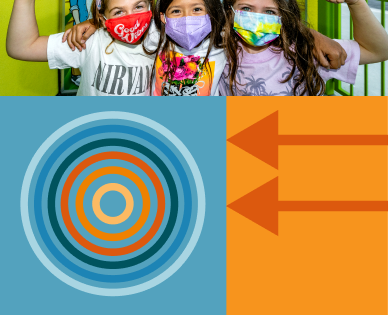

Discovery Cube
Partnership
Although the pandemic kept the Cube closed for nearly half the year, significant progress continued with the construction of the Organic Waste Lab. The new outdoor EcoChallenge exhibit opened on May 28, with the reopening of the Cube. On July 22, the unveiling of the Organic Waste Lab was celebrated by community and district partners and key community stakeholders. The County also presented Discovery Cube with a check for its continued support of conservation education.
This new exhibit marked a critical achievement towards the regional education mandates of SB 1383. Families could now learn first-hand about organic recycling changes, experience the science behind the composting process and understand their role in preserving environmental resources.
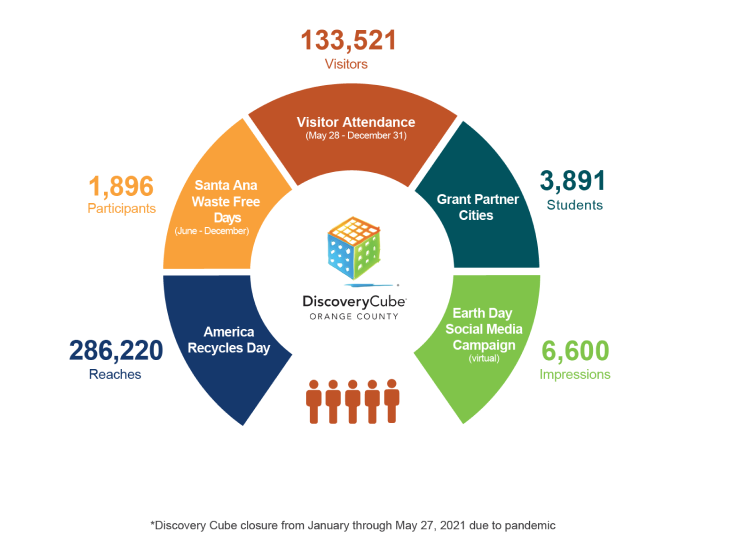
Approximately
432,923
educational touchpoints
through visitors, field trips, promotions and waste diversion outreach campaigns.


Grant Program
Through these partnerships, Discovery Cube is bringing a comprehensive educational program to students at no cost to local schools. For the 2021 school year, Discovery Cube partnered with five cities across two counties reaching 3,891 students.
Mobile Kiosk Pilot
At the Irvine Global Village event hosted in October, OCWR tested a mobile kiosk version of the World of Organic Waste programming created by Discovery to take organic waste education on the road. Feedback from the pilot is helping streamline the units for 2022.
Orange County
Department of Education
In 2021, OCWR and the Orange County Department of Education (OCDE) launched a next-generation curriculum that brings waste diversion education directly into classrooms as part of standards-based teaching. We launched a first-year pilot program in Spring 2021, offering teachers essential tools to meeting state requirements tied to local environmental initiatives. Regardless of pandemic impacts, we pushed forward with a successful pilot and right into a full-scale, County wide program in August 2021. The curriculum utilized OCWR educational materials in a variety of formats, provided simplified access via existing teacher and student portals and seamlessly created a foundation for future expansion.
We successfully served 2,501 students through 88 teachers across 51 schools and 14 school districts. From the Spring pilot to full-scale launch, participation increased by 68 percent, and we sustained 100 percent teacher retention into the Fall 2021 school year. This set the stage to expand curriculum to additional grade levels and languages into year two.
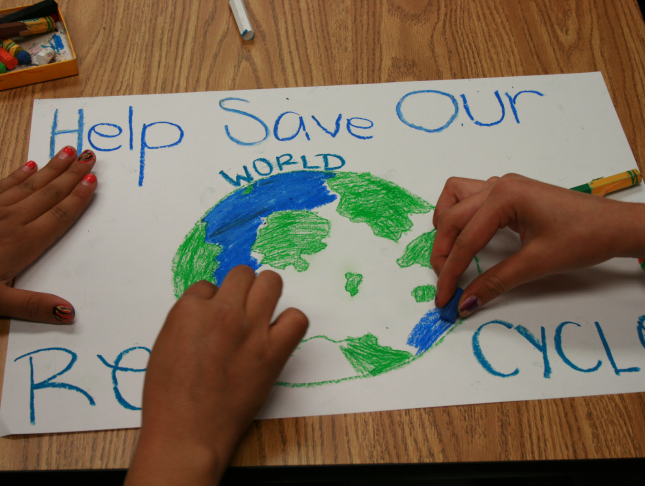
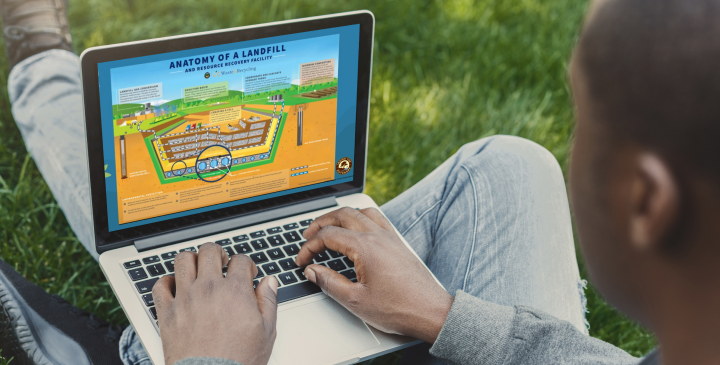
EVENTS
OCWR participated in several in-person, virtual and online outreach activities, adjusting as needed during the pandemic. These included community event booths, landfill tours, virtual campaigns and speaking engagements.
Social Media
Social media enables OCWR to consistently communicate with the public. Informational posts share important updates on weather-related impacts and closures. Targeted campaigns help increase followers on all platforms including Twitter, Facebook and Instagram.

The Trick-or-Treat October campaign quizzed followers in weekly true or false posts, with the top post garnering 725 engagements and a reach of more than 6,000 unique viewers.

“I pledge to recycle by advocating the importance of recycling at my school and my community.”
The America Recycles Day® campaign welcomed followers to participate in a contest by pledging to recycle in the comments. All participants were awarded a family four pack of tickets to the Discovery Cube to experience OCWR’s World of Organics Waste Lab. The contest inspired pledges to recycle and a local high school student to start a battery recycling program in his science class.

OCrecycleguide.com
71K
PAGE VIEWS
Appliances, large and small
Computers, televisions, electronics
Batteries
Clothing and shoes
Cardboard
Grant program update
Despite continued COVID-19 impacts, OCWR grant program recipients continued to thrive and make progress towards each of their respective goals to achieve compliance, conduct education and recover edible food. Recipients were granted deadline extensions allowing for reimbursement into year four of the grant program, while the fifth and final year will require recipients to continue programming without receiving financial assistance from OCWR.
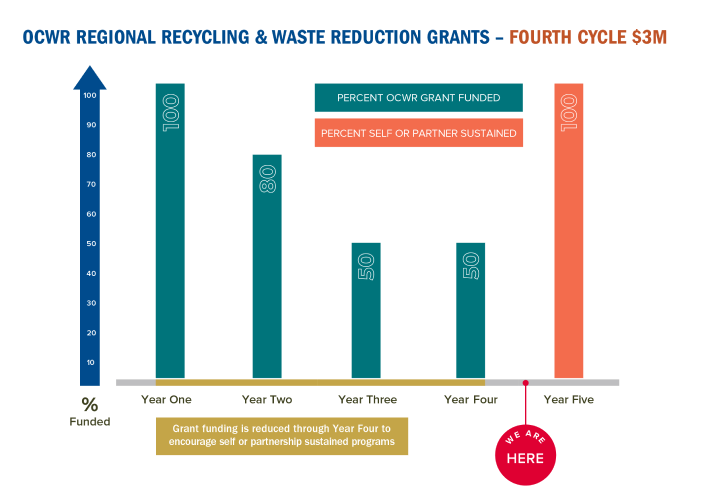
In 2021, OCWR grant recipients:
Educated more than 10,000 students and residents on waste diversion and proper recycling
Collected nearly 10 tons of organic material
Recovered and distributed 10,600 tons of edible food to combat food insecurity
Aided more than 260 commercial businesses with compliance
Household
Hazardous Waste
Our Household Hazardous Waste Collection Centers (HHWCC) provide a highly valuable service to OC residents and play a critical role in the proper disposal or recycling of materials that should not go to our landfills.
TOTAL POUNDS OF ITEMS TAKEN IN
| 2019 | 2020 | 2021 |
| 5,555,996 | 5,736,212 | 8,707,841 |
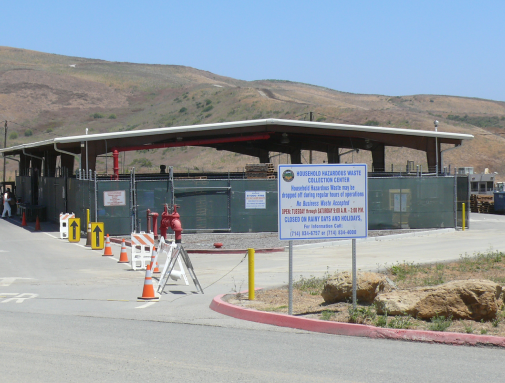
Recycled vs. disposed
Recycled= 636,315 Pounds vs. Disposed= 2,398,130 PoundsSome materials reach the end of their life at the HHWCC and are transferred to Class 1 Landfills that accept flammables, sharps, corrosives and poisons. Others, such as fire extinguishers, propane tanks and alkaline batteries can be recycled.
Material Exchange Program Takeback Items
887,893 PoundsHHWCC customers may select up to five items per day from those brought to the facilities. Such items must be deemed acceptable for continued use after initial drop off. Among them: motor oil, bug spray, car wax, paint and other household items.
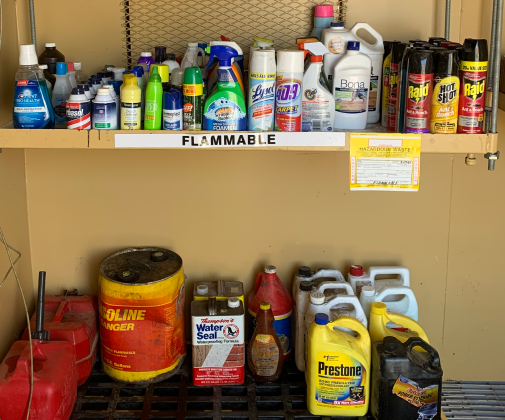
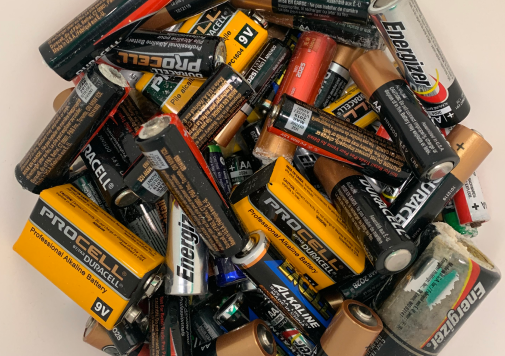
Batteries
Alkaline= 228,275 Pounds • Rechargeable= 24,371 PoundsWhile alkaline batteries are not recyclable, rechargeable batteries are. The HHWCCs send these to a program called Call 2 Recycle, the nation’s foremost consumer battery recycling stewardship program.
Paint
160, 839 Gallons to Paint CareOCWR launched a new initiative to recover leftover or unwanted paint, which is recycled into such products as asphalt sealer and paint for graffiti abatement.
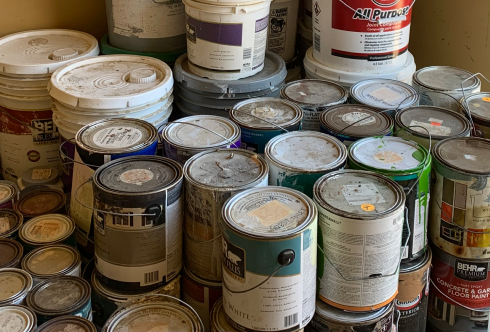
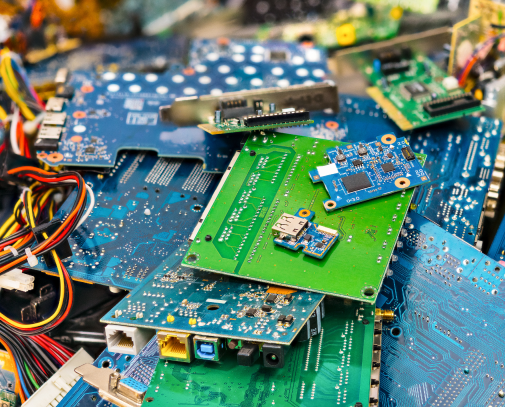
E-waste
Non-CRT= 2,756,542 Pounds | CRT= 474,948 PoundsThe volume of electronic waste is increasing every year as new types of devices become available. E-waste includes such items as anything with a circuit board, TVs, monitors, computers and mobile phones/tablets. Items are recycled using our contractor third party E-Recycling. Items are dismantled and precious metals are separated for scrap metals.